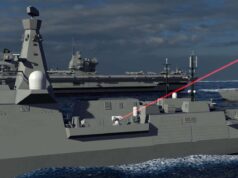With an increased focus on tackling climate change in recent years, is it possible for a world-class blue-water navy to be green?
The article was submitted to the UK Defence Journal by Joseph Hopwood of Exeter University. Joseph was recently awarded a scholarship by the UK Naval Engineering Science and Technology (UKNEST) a forum to represent the UK Naval Defence sector.
To reduce emissions in the Royal Navy, innovative solutions need to be found. These solutions will come from new and emerging technologies and improvements in through life environmental impact in shipyards, maintenance facilities and system and equipment suppliers. All of this must be done while maintaining the capabilities of a blue water Navy which can be deployed anywhere in the world on sustained operations to project power in the maritime environment.
Emissions
Shipping makes a significant contribution to the emissions of nitrogen oxide (NOx), Carbon Dioxide (CO2) and Sulphur dioxide (SO2). These pollutants cause adverse effects on human health, including cardiovascular and respiratory illnesses. Other effects include acid rain which causes environmental damage to plants and aquatic animals. [1]

Solving the Issue
Marine organisms accumulate on the surface of the hull, increasing both the weight, drag and ultimately fuel consumption by up to 40%. Modern Anti-fouling paints use chemicals to inhibit the growth of organisms, but the chemicals damage the organisms and interrupt the food chain. A new solution developed at Kiel University uses the mechanical properties of poly-thiourethane to create a better contact to the hull prevent organisms growing on hulls by making it harder for them to latch on, this had found to be significantly better for the environment. [2]
Biofuels are derived from biological waste often from agriculture and reduce CO2 output by up to 90%. However, investment in facilities which support biofuels are needed and there are concerns over land use where bio-crops are grown rather than edible foods, adding to food insecurity. Newly developed biofuels such as solid (woody) biomass, through technologies such as pyrolysis a higher energy yield and can be made from recycled woods. [3]
Support facilities should consider improvements to their buildings, manufacturing process and procedures. Energy reduction improvements in buildings such as insulating buildings and automated lighting, along with reducing office space by encouraging flexi-working and changing to paperless offices are all small improvements. Using green electricity is also significantly lower than the impact of grey energy (green: 0.012 CO2 emission factor, grey: 0.526 CO2 emission factor).
Greater knowledge sharing on environmental matters such as energy efficiency audits by different companies could allow them to learn from each other. By investing a little time, effort, and having an open mind current shipyards, suppliers and navies can reduce the impact on the environment. [5]













My view is in piece time then the forces should be as looking at some green technologies, renewables could offer some strategic advantage but then in wartime being able to surge by using traditional fuels has advantages also. Budget is another constraint, green alternatives are the more expensive option in most cases so I would certainly not want to cut capability for a green agenda. Overall though the UK armed forces even if they were entirely carbon neutral would have almost nil impact on climate change there’s other areas that should be a priority.
Maybe that’s the plan… Cut the armed forces, reintroduce horses and swords and be truly carbon neutral. Although… I have often wondeted if anti submarine vessels should have a sail option to drift silently when on the hunt
?
Put HMS Victory back into service and do it now, Cummings would support it I’m sure as an appropriate savings measure.
You are not taking into consideration horse farts.
Absolutely Expat. There should be an effort across our defences to see how many savings can be attained however, in times of crisis no restrictions should be applied.
In the past the defence research effort was seen as a national asset supporting not just the armed forces, but also wider national efforts. I would suggest that the defence could and should play a part in a wider government effort to support the development of a green economy going forward.
I would also suggest that going green and actually tackling the Clinate Crisis head on would reduce the risk on conflict in the future, in turn reducing the potential need to put our armed forces in harms way. Getting off the drug that is oil may hopefully allow us to reduce our involvement in the Middle East for example.
There would obviously still be potential flash points so I agree that going green should not adversely affect capability as that would put our people in greater danger.
I would also point out that about 10 years ago the US armed forces were amongst the biggest investors in the world into green tech. particularly fuel as they were concerned about the long term security on their fuel supplies, especially when deployed from home base. I don’t think the US capabilities have suffered by thinking green thoughts…
Getting off the drug that is oil.
That’s the problem. Oil, makes money, and the
companies making that money want to
Keep it that way.
Anyone read the book “Hunt for Zero Point” ?
Real UFO type stuff, anti gravity tech.
No need for conventional fuels or engines.
Nick Cook from Janes Defence authored it, unusual for someone respected in the aviation field.
Just one of the things they are developing out in Nevada under black programmes. UAV or UFO type craft that can literally fly like a fly, instant turns on the spot, high speeds to stationary.
Might not be “Green” in the truest sence.
The experiments with electricity and Thomas Brown in the 50s are also eye opening.
That book is on my list to read. There must be more going on with the black programmes than we have seen to date. I wonder if they tell Trump everything or would he just tweet a picture of their UFO if they did!
Totally Rob. The figure I keep hearing is that the
“White world” is 20 to 30 years behind the “black world”
I doubt Presidents have a full briefing. They have no need to know.
Hi Daniele,
Yeh the tech is interesting. I actually built a ‘lifter’ using very high voltage (from a VDU). I couldn’t get it to work reliably, but it did sort of work for a few tests. It works on the asymmetric capacitor propulsion principle. So yes there is much technological development going on some of which would support the development of green armed forces.
I also think that change is required around the economy and the business models that support and contribute to that economy. These changes need to be supported in a broad range of policy areas, and defence is only a small but interesting and potentially influencial part of the whole.
Wow. Respect.
Hi Daniele,
This link shows how it can be done.
https://www.youtube.com/watch?v=006d36WWyaQ
The way I did it was to take the main high voltage lead off the electron gun of a VDU and hook it up to my capacitor. My version tipped over rather than lifting off the bench because my connecting lead was too heavy. Unfortunately, the circuit blew before I could fix it! I figured that was good enough to be going on with as the voltage on the capacitor is about 30kV – real hair curling stuff – and me workshop at the time was a tad small to be literally bouncing 30kV around me ears!
Of course I am assuming you were refering to my lifter and not the rest of me post 🙂
Yes mate. I’m not technical at all and that stuff is waaaaay over my head.
I would be inclines to agree but if we’re talking about stability then why shouldn’t the DiFD pay and the armed forces piggy back of that investment. And if you think about it where its a field hospital or aid camp the green power tech is likely to be the same.
Hi Expat,
I think we are both talking about cross Department strategies, something the UK is rather poor at doing, at least when it comes to long term capability investments at least. Other departments that would be obvious participants in any pan-Government initiative would be Department for Business, Innovation and Skills and the Department for Transport.
The latter comes with the added complexity that some of its responsibilities are devolved, so guess who else would need to play along… 🙂
Anything that involves more than 1 budget seems to become partisan as everyone gets precious about THEIR budget, even when the cash is all coming from the same place.
I agree that a number of inputs could be useful and you’d hope that something could be sorted. Having worked with people from other organisations/Forces its not a huge problem with those at the bottom of the pile, it does seem to stem from further up.
‘it does seem to step from further up.’
Seems to be nothing new. I remember reading about the troubles the Fleet Air Arm of the RAF had in the run up to WW2. The RAF guys on the carriers got on well with the RN, but the RAF and RN top brass could not agree on appriate equipment for the force. As a result, even with the FAA transfered to the RN, they lacked decent carrier planes throughout most of WW2. It says alot for the FAA that they were able to achieve as much as they did..!
Actually green alternatives are often cheaper over time. Look at EVs… Mine is significantly cheaper than a compatible petrol car over 3 years. Wind power is the cheapest firm of electricity generation followed closely by solar.
As for the ships, they could give them sails like quite a few container ships have these days. They aid the props and reduce emissions. As most new ships are powered by electric motors they could easily put batteries in board and charge them via solar panels that could be hidden during war time ops. They could also be charged at port. These can all aid the more traditional propulsion systems and significantly reduce environmental impact. They also have the added benefit of being back up systems in times of emergency.
I agree though that during war ops they would need to be able to revert to more traditional propulsion.
Actually if you google ‘HMS Invincible yacht conversion’ you’ll find some articles which were proposing converting the old carrier to have sails. I believe they wanted money for the DiFD to do the conversion, alas never came about. But would have been a great demonstration of the UK capabilities and could have found its way into future platforms.
That is interesting. There are some very cool technologies in sails right now. One is to have the solid vertical wings (which I imagine could be made from radar absorbing materials) which are astonishingly efficient and can even be sailed into the wind.
It would be good if they Keep at least one of the outgoing Frigates to experiment on.
maybe in the years ahead titomic will have sorted out either a titanium coating or a titanium copper coating for ship hulls with no anti fouling required & good for 20 years or so which will help the invironment cheers
What would painting them green achieve? Mind you, could be a signature colour for the Irish navy! Just a thought…
And the Irish national colours actually blue, no really.
Well, I’ll go to the foot of our stairs!I didn’t know that.
Optimise propulsion efficiency, thus minimising fuel consumption. This saves on the cost of fuel, and more to the point minimises the logistical burden associated with deployments. This is justifiable for obvious operational reasons, and also reduces emissions as a side-effect. Of course it’s also what power plant designers and manufacturers already do.
Compared to commercial shipping that uses low grade marine diesel fuel which is heavy in sulphur the military spec F76 type Dieso fuel is far far cleaner. The engines the military use are also far cleaner with many modern marine diesel power plants meeting the latest Euro Class Emission standards. GTs not so much but they are still cleaner and dont need scrubbers as do most slow speed commercial units . LPG and Natural gas power is a reality on commercial vessels but for the military its probably a none starter for obvious reasons.
In the commercial world there is now a massive push to introduce IMO compliant Scrubber units into commercial ship exhaust systems because it is a mandatory requirement to have them fitted. Where I am we are fitting at least 4 units a month into ships and these are huge costly modifications to put in involving new pipework, exhausts and steel work to house them. A typical scrubber unit on a VLCC is 8 m in diameter and 15m long.
Paint systems cutting down both drag and marine growth help fuel economy along with regular hull cleans to ensure the fuel curve stays within acceptable limits. Modern paints such as X7 and Intersleek are very expensive to apply. Full hull blasting and a 5 coat paint system are not cheap but the savings are realised and it pays for itself within a year. A modern paint system is worth 10% fuel savings.
Other additions also save fuel and make a ship greener. T23 had a transom flap added that helped to save something like 10-15% fuel.
On commercial ships ducting nozzles and mini props on prop hubs can save 10-15% in fuel. Other upcoming technology will involve a hull being coated in air bubbles ( A Prairie Masker type system on steroids for those who remember it!) to reduce drag. Some vessels are now going around with sails (Yes Sails!) fitted and these are realising yet more savings. Maersk is probably the biggest and greenest commercial operator using all the green tech it can get. Fuel savings mean less expense so commercially it makes perfect sense as it improves the bottom line.
Onboard Pyrolisis systems to turn waste material to inert ash on ships helps to reduce the waste footprint of a military vessel. LED lighting and modern electronics have reduced waste wild heat and mean equipment runs cooler ( less power intensive cooling systems are needed ) and they run on less power.
Getting greener is possible and the cost saving are a huge driver along with the good publicity it brings. The reality of a 100% green military vessel is not going to happen though as its not practicable in the environment and conditions that they need to operate in.
It makes a change from being on a grey ship but I still think the WW2 dazzle ships had the best colour scheme.
Wouldn’t hurt I suppose, but making it a priority would be odd when budgets are as they are. Could stimulate renewable industry though
Climate change! We can’t do jack about that but global toxic pollution is the real problem. And volcanoes and animals produce far far far more green house gases than humans by a huge margin. But We have to stop the mass polluting of the oceans and rivers and land with plastic and stop coal power stations and stop the huge population growth that’s going to cause more problems than climate change by one degree.
Nuclear is a great clean energy if we can only dispose of the nuclear waste properly it’s one of few clean energy’s with not allot of emissions for lots of energy output. And The climate has always changed and always will, in the UK 10,000 years ago (last ice age) we had a mile of ice above us! That’s real climate change and it wasn’t humans that caused that.
Of course we can do something about climate change!
One huge volcano eruption and all the hard work gone!,we can do loads about the pollution of the world and in turn it might help the climate. And the oceans alone release many many times the green house gassed as all the cars and humans as a whole do.
That is not true at all. All the world’s volcanoes emit 200 million tons of co2 annually. The world’s automotive and industrial activities emit 24 billion tons of co2 annually. Stop repeating the oil industries fake facts…in fact large volcanic eruptions actually cool the climate due to the particles reflecting sunlight back into space…
What can we do about our climate? Drive electric cars and use solar power? Yeah that would be great and should happen, but like I said the earths oceans and animals release far far far more green house gasses than humans cars ad coal fired power stations do. Pollution is the real problem.
The point is that earth’s animals emissions are pretty well balanced with the plant lifes ability to absorb the co2 etc. Unless we are talking about farm animals which collectively emit huge amounts.
We could obviously farm less animals by eating less meat.
Oceans actually absorb greenhouse gas and the heat. This is why hurricanes are getting worse as there is more energy in the oceans.
The problem is us humans, we are producing far too much greenhouse gas and cutting down far to much forest. while farming too many animals. So yes electric cars and renewables along with less meat eating and better industrial practises can solve the problem. We just need to actually do it. We have known these issues and many of the solutions since the 60s but have just ignored them or in the case of companies like general motors and the oil industry, have actively prevented the solutions being brought forward.
The real elephant in the room is the amount of people on the planet, especially us First World types who consume a LOT of resources.
Now telling us all that we can only have 1 kid is probably not going to be a vote winner.
Nope and not enforceable either. However we can reduce our energy consumption quite easily and also change where we get that energy from to better sources. There is a lot of low hanging fruit that is easy to pick off without really affecting people much.
Agreed Lee, I think most of us are on the same page and want to make the most of technology to do what we can. Just pointing out that less people would be less of a drain on resources and produce less of the bad stuff. The tricky bit is to convince us to get to this place.
Lee nobody can do anything about the climate changing , they never have and never will. It’s called “The Weather” it changes ,that’s what it’s meant to do
Lol is that you president Trump?
Weather and climate are two different things. Weather is affected by climate but climate is not affected by weather. Climate change is obviously something we can change.
? we could argue all day on this subject man but outa previous learned experiences in here I won’t bother as I don’t think Joe Blow appreciates it . So we can agree to disagree Bro. Prof Timothy Ball- climatologist , prof Ian Clark- Hydrogeologist , William Kininmonth -meteorologist and former Australian delegate for world commission climatology ,Harrison Schmitt -geologist and former NASA Apollo 17 astronaut the list goes on and on and on they all say it’s a load of old bollox as well so not just me and my man Mr Donald T that are saying it ?????????????
Whether Climate and Weather are the same thing or not is not up for debate it is fact…
Now lets take a look at those esteemed people you are referencing.
Timothy Ball is not a climatologist. He has claimed he is but has never provided any evidence to support his claims and there is not record of him ever being a climatologist. A judge in a Canadian court said this of him during a defamation lawsuit that was brought against Ball… “lack a sufficient air of credibility to make them believable and therefore potentially defamatory” and concluded that the “article is poorly written and does not advance credible arguments in favour of Dr. Ball’s theory about the corruption of climate science. Simply put, a reasonably thoughtful and informed person who reads the article is unlikely to place any stock in Dr. Ball’s views…”. The main organisation he associates himself with (and sit on the board of) is the Friends of Science, who are funded considerably by the oil industry…
Ian Clark is also not a climatologist. He is a hydro-geologist which is by the way nothing to do with climate science… He is linked with the following organisations. Competitive Enterprise Institute (Funded by conservative leaning companies and oil industry), Natural Resources Stewardship Council (Hid their funding contributors but later found to be Oil companies etc), Fraser Institute (Funded by oil corporations along with David and Charles Koch who made their fortune in the oil industry), The Heartland Institute (Worked to overturn Smoking bans by attempting to discredit second hand smoke effects etc and again gains a lot of funding from the oil industry).
William Kininmonth is indeed a meteorologist. However he is retired. He has been widely discredited in the scientific community for peddling clearly untrue statements.
Harrison Schmitt is also obviously not a climate scientist. He does however indeed have a degree in Geology. However he has had a chequered past with regard to scrutiny and has also worked extensively with the Heartlands Institute (See above). He also promotes the whole thing as a communist conspiracy theory, which is not a good look. I imagine he would also be a flat earther if he had not actually been to the moon…
If you have some actual verifiable facts to divulge then please do. However if like all these people you have listed you are just going to peddle “Alternative Facts” that are simple to discredit then it is no wonder you end up losing the arguments…
Please read up more on the subject and gain a proper understanding of the issues rather than listening to conspiracy theorists and paid shills.
? whoa somebody is a wee bitty extinction rebellion … anyways I named just a handful of people who disagree with your theory all much smarter and better qualified than you.
It’s easy to attempt to discredit those with alternate views and the smears and lies that get printed about people is a 2 way thing as you well know it’s just you believe the propaganda the left spews about them..
Anthony Lupo- prof atmospheric science Missouri uni
Katherine Hayhoe- prof -climate centre Texas tech uni
Wibjorn karlen -prof university Stockholm
David Dilley – ms bs in meteorology
Murray Salby atmospheric scientist
Nedialko T Nikolov -phd ecological modelling
George H Taylor -retired director Oregon climate service Oregon uni
Tim Patterson paleoclimatologist prof -Carleton uni Canada
The list goes on and on and on all clever people who don’t subscribe to your views but I’m sure you’d attempt to discredit any and every name I put on here which shows how silly it is to try fool people into believing that every one of them is a shady dark fraud all lying .
Anyways nobody is arguing I prefer talking about guns than the “weather” any day of the week ???? Rule Britannia baby???
It is just so easy to discredit these people as they never actually come of with any verifiable facts and are rarely climate scientists. I mean intelligence is not the same as knowledgeable in the relevant field. I mean Steven Hawking was one of the most brilliant minds to ever grace the earth but I am not sure I would have called him up to fix my boiler.
If you can list any specific verifiable facts regarding non anthropomorphic climate change then please feel free to post them here.
I mean most of the people you have so far mentioned have given statements that are clearly untrue based on even the data that is available to them!
Here is a little secret I will let you in to. Science is open and free. You can look at any paper published on climate change and go into the data yourself and do the same tests that they have done.
I am also nothing to do with Extinction Rebellion and their crazy leaders. They are doing more harm than good. I do however have a physics degree and so am well versed in scientific method. Scientists are perfectly welcome to challenge the consensus on climate change just so long as they are actually showing good methodology rather than peddling conspiracy theories. If someone comes up with a good and provable reason that they think Humans are not responsible then they are free to publish their findings for testing by the wider scientific community. The problem is that non of these people arguing against human induced climate change have managed to submit papers that have passed scrutiny yet.
The evidence is overwhelmingly in support of humans being the cause and therefore the solution.
Fascinating reading Lee1.
You’ve convinced me.
I won’t argue either way on anthropomorphic causes for climate change (although it’s improbable that is the single cause). However, I can speak to the value of science …
It tends to offer a good guide – but science ‘facts’ are always true only until they are not.
For example, using exactly the same measures that have defined the age of our Universe, recently, a star has been discovered within it that is older than the Universe. Therefore impossible. Which is now true? The age of the star or the age of the Universe? No doubt someone will tell us the ‘fact’ of the matter soon ……until someone else proves it different, that is.
Nuclear is the most dangerous, toxic, reckless power source. To call it “green” is ludicrous. Centuries of pollution once the first nuke powered ship gets sunk, but many are dazzled by the science & technology.
There are a number of nuclear vessels that have already been wrecked and the impact has been undetectable. Modern designs of small modular reactors would be even safer, especially those of the molten salt variety. The most damaging of the ‘green’ fuels is bio-mass which for use on land has been shown to be more destructive than burning coal.
Nuclear propulsion. The rush to Small Modular Reactors, could lead to safe, affordable reactors, first on land, then transferable to ships. Don’t tell me it was tried in the 1960s, but was too expensive. Reactors then, needed to be refuelled every four years. Now they last the life of the submarine. What if the ship sinks? Well some of the SMR designs use fuel that is only lightly enriched, so the risk is minimal compared to more highly enriched fuel used up to now.
And all our ships would be banned from many of the world’s ports!.
If introduced today, but I am talking 20+ years from now. First the new SMRs have to be developed & built on land. If they then prove economical, they could transfer to sea. It would not just be Britain. At first it would be nuclear powers to start. You can imagine China sending a massive, nuclear powered, container ship to USA, France or UK. Or Europe to North America, a combined Cargo/passenger ship. One way for Greta to get to the UN when she is older.
As for SMR designs, one at random, is the Frazer Nash, Terrestrial Energy Integral Molten Salt Reactor (IMSR), that uses low enriched Uranium fuel (less than 5%).
Or you could look at Ultra Safe Nuclear Corporation that is developing a micro modular reactor that uses tiny particle uranium fuel wrapped in Triso, that prevents any leakage regardless of accidents. USNC is Seattle based, but the first IMSR will be at Chalk River Laboratories in Ontario Canada.
This is total horse ? instead of wasting there time on this garbage they should be Entirely focused on how to prosecute violence against there potential enemies with extreme prejudice in a fashion that limits the risks to Our personnel. Cos I can tell you Russia and China don’t give a monkeys about anything other than how to kill there foes better. Don’t get outa the boat unless your going all the way…….
Greener equipment is likely to be cheaper to run and therefore free up money to spend on more equipment. It also supports UK industry.
Once fusion power becomes a viable option, that will the be the only way forward. Effectively infinite fuel with a very high efficiency. And converting our existing ships should be pretty easy. Not sure about our frigates and destroyers Etc, but I know the QEC vessels all have a high voltage system. The ships is powered by a couple large diesel generators, but all of their power output is is electrical. The propulsion is electric also, so switching these generators out for the fusion reactors shouldn’t be a problem. Once this comes about, the world is sorted. Well kind of.
Bring back the magnificent sail men-O-war!
That is not such a crazy idea. Large tankers have had kite like sails for a number of years now and they are reasonably easy to fit into current ship designs. They can reduce fuel consumption considerably.
The proposals a few years back for the Black Swan Sloops of war, included using kites to provide wind power.
Just a quick check – have any comments that question the above article with regard the ”climate emergency” and ”acid rain” been allowed to stand? Or is it just mine that have been deleted…?
I’m all for it, when done wisely- and a lot of guys below have mentioned some great points.
The less we are reliant of fuels that are not produced in the UK, the more strategically secure we are; it means we are freer to pick and choose our involvement rather than be dragged in. Also, as fossil fuels get more scarce, the more expensive they’ll get. Best put in the money upfront and get the alternative up and running sooner, rather than get caught out and pay more later.
Biofuels and fuels made from waste are both great for this, particularly as we really shouldn’t be exporting our waste if we can help it. Also, as Brexit comes up, there is widespread concern in the farming community about their future- future trade deals may well make their more environmentally friendly but expensive methods difficult to maintain with competition. But there is less concern about food production here, so they could certainly augment their income with biofuel crops. Having domestic production of these, that can be used both for the military and for power generation, gives the UK far greater sovereign energy security.
In addition, as has been mentioned, the UK is a technology leader in renewable energies and technology; this is something that should be doubled down on with Brexit around the corner because it is a complex high demand industry that we can be truly competitive in. Incorporating renewables at the very least onto bases and infrastructure will benefit both the military and the economy.
While nuclear is an impressive power source in many ways, it doesn’t really provide us with the energy security we’d like in the same way- aprticularly the way that our current government is pursuing it; selecting a reactor design that has never been successfully implemented due to complexity and budget and schedule overruns, built with French expertise and Chinese investment. In addition, the nuclear fuel isn’t sourced from the UK, and disposal of it is asomething of a nightmare. I know we’re a global economy these days, but there is a limit to how reliant we should be on other countries when it comes to the fundamentals of keeping the lights on across the country. Renewables and biofuels, combined with grid-scale energy storage are the way forward for me.
What about hydrogen power for ships?
I remember a few years ago that it was being talked about as the perfect solution for oil tankers and big container ships…
I suppose safety would be a big issue for warships but civilian use should be alright
Fusion, Cella energy hydrogen beads which could be used in internal combustion engines but the focus is on electric cars now (oil companies are interested in this UK firm), biomass, rape seed, sail? Apart from the cleaner forms of power, we need to look at potentially (in the future with development as with power production) better forms of (Star Warsy) propulsion too that have been around for a while.
I really think the armed forces are the last place for this argument. Fighting efficiency and its resulting cost are the only factors we should be fascinating ourselves with; i.e.: tactical value, and the ability of a state to field an assest in useful numbers, and to deploy it to useful places. God knows we don’t need to be introducing yet another compromise to the mix. The weighted contribution of the armed forces to any sort of pollution must also pale into relative obscurity next to the contribution of regular commerce, small as those armed forces already are.. Perhaps if Harry & Meghan just stopped flying everywhere..